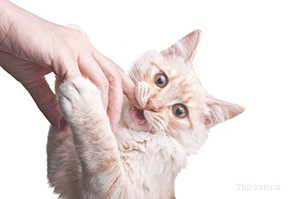
A recent Pasteurella outbreak is responsible for killing many thousands of the saiga antelope (click here to learn more). This may have you wondering what Pasteurella is, and if other animals (including your cats) are at risk. Here I will discuss Pasteurella and explain the dangers.
What is Pasteurella?
Pasteurellosis is not a new disease but it’s one you may not be familiar with. Named after Louis Pasteur, the disease was first isolated by him around 18801.
Pasteurella sp are a genus of zoonotic bacteria (meaning they can be passed between animals and people). There are a number of species and sub species, but all are quite similar2. They are a natural inhabitant of the skin, digestive tract and oral cavity of cats, but can cause disease under the right conditions. The bacteria can spread from cat to cat when aerosolized (by way of coughing or sneezing). It can also spread through bite wounds (when saliva enters open wounds). The result can be abscesses or an infection in the blood stream (septicemia) which can result in serious or even fatal repercussions.
What kind of disease does Pasteurella cause in cats?
Pasteurella may cause:
- A lower-respiratory-tract infection (pneumonia) which is often fatal.
- Ear infections
- Nasal and sinus infections
- Eye infections
- Joint infections
- Infection of the covering of the brain and spinal cord
How is Pasteurellosis spread among cats?
Because the organism lives in the mouth, it can be readily spread by bite wounds or by licking open wounds. This leads to wound infections and even abscesses and deep infections.
Click here to learn more about the dangers of cat bites.
Is Pasteurella contagious from cats to people?
Yes, the organism that causes canine pasteurellosis is very capable of infecting humans. It is always important to consult your physician if you have received a bite wound.
How is Pasteurella diagnosed and treated?
The organism can be isolated by culturing the involved tissue. Your veterinarian may run tests to determine the most effective antibiotic to use, but, in general, penicillin is effective2. Other antibiotics of value may be recommended by your veterinarian.
How can Pasteurella be prevented?
While there are no available vaccinations, there are definitely steps that can be taken to reduce the likelihood of transmission to other dogs and to humans:
- Prevent fighting among cats.
- Maintain good oral hygiene of cats
- Promptly treat infections of the ears, skin and respiratory tract that may indicate the presence of Pasteurella
It’s important to prevent exposure to cat saliva through open wounds by avoiding cat bites and preventing cats from licking open wounds
Always consult with your veterinarian about immediate care if your cat is bitten.
If you have any questions or concerns, you should always visit or call your veterinarian -- they are your best resource to ensure the health and well-being of your pets.
Resources:
- Harper, M., JD Boyce, and B. Adler. "Pasteurella Multocida Pathogenesis: 125 Years after Pasteur." National Center for Biotechnology Information. U.S. National Library of Medicine, Dec. 2006. Web. 28 May 2015.
- "Pasteurella Spp." Vetbook.org. University of Sidney, Web. 28 May 2015.
